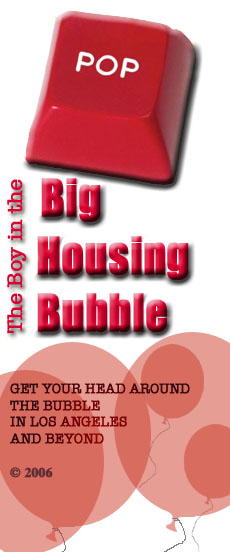Real Estate Agents Drowning In Sea Of Silk Flags
Link To This Post
I ventured out on a fact-finding mission this weekend and spoke with some Los Angeles real estate agents. I waded through the sea of silk flags that popped up on every street corner from Venice Beach to Chatsworth and gained some interesting perspectives, if not decisive information.
It should come as no surprise that real estate professionals don't like to acknowledge that there's a bubble, and so they don't use the word. They don't even whisper it. They prefer terms like "cooling down" and "returning to normal." I like that last one best. "Returning to normal." What's "normal" in real estate, or in Los Angeles for that matter? I guess normal is whatever you want, just as long as you sound convincing when you say it.
Here's what I put in my notebook:
1. Inventory is growing at an alarming rate, the magnitude of which hasn't yet shown up in the published reports. It has, however, become apparent in the number of for-sale signs on any given corner. Agents say this is starting to scare some buyers away. They're not used to seeing so many homes for sale and so they interpret the sight as signal to back away.
2. Speculators have not left LA. In fact, some agents say they know flippers who are about to flop. They continued to buy in as the market peaked in the summer and fall of 2005, spent the winter remodeling, and now find themselves holding real estate they can't unload. One agent said it's important to pay attention to the number of signs that have both "for sale" and "for lease" on them. That, he says, is a flipper in panic mode. I saw several of these, but not many.
3. Everyone who was waiting to sell at the top of the market is planting a for sale sign in their front yard, to no avail. Homes are staying on the market much longer than they have in the past few years. In some cases, homes have sat for more than three months despite "significant" price reductions. As a result, sellers are becoming harder to please. They switch between listing agents almost month to month. Agents are fighting for the listings. It's turning more cutthroat. There are still more licensed agents than there are homes to list.
4. Buyers are spending more and more time shopping on the Internet before even contacting an agent. Some agents embrace it and are trying to beef up their web-based presence, but others reject it as nothing more than a fad (tell that to the travel agents). Some might think this is a no brainer, but to many new and seasoned agents, it's a new phenomena. The Internet's influence on real estate is still being determined. Throughout the boom the Internet was little more than a way for buyers to learn about an agent, or about home buying. They didn't really get a lot of time to learn about a particular listing. Hell, by the time a listing made it to the Internet it was already sold. That's no longer the case. Now there's nothing but time, and no end of information about a house for sale. People are taking their time to investigate.
5. Once buyers connect with an agent they want him or her to show them everything within their price range before they make a decision. This is eating up a lot of time for agents who have gotten used to spending minimal time "shoping around." Agents would prefer buyers just make an offer on the hood of a car after visiting the open house. A night to sleep on it? Ok. But a week, two weeks, three weeks? The wait is maddening in particular for agents who just got their license in the past five years.
6. Agents are scared, and are scaring people off. The inexperienced ones pounce on anyone who looks willing to buy, and it's upsetting a few of the buyers are still out there, giving everyone a bad name. Why are the agents scared? All the obvious stuff, and some that's not so obvious. One guy said he was particularly frightened by the sight of a Chrysler commercial this weekend that was offering 60-months at 0% interest. Why should this scare him? He says it's because it's clear that people are starting to rein in their spending on big-ticket items. He says 0% interest on a vehicle at today's rates is a clear sign that auto manufacturers are panicked, and when those guys get scared, he says, it's time for everybody to get scared.
— The Boy in the Big Housing Bubble




<< Home